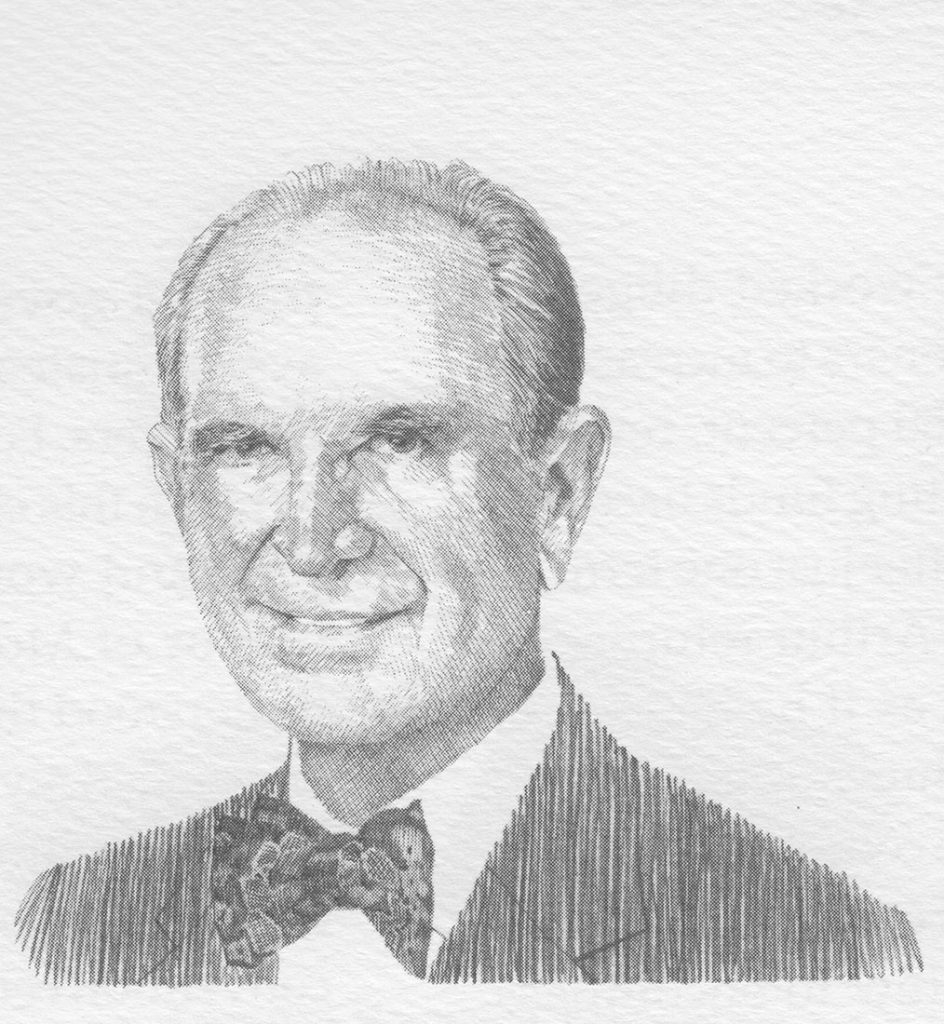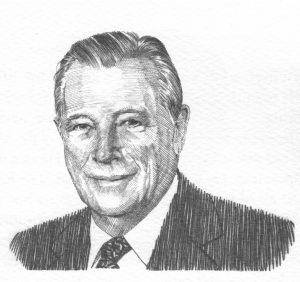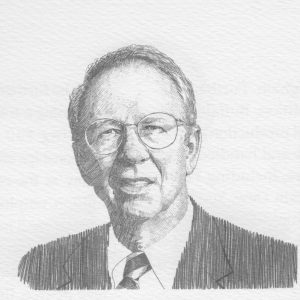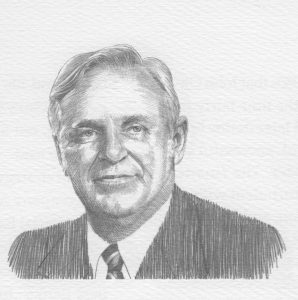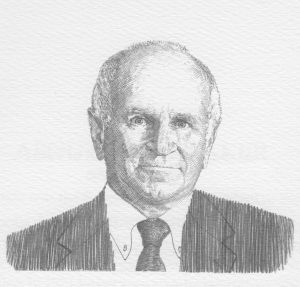Elton Stephens believes anyone can successfully sell anything.
Founder and chairman of the board of EBSCO Industries, Inc., Elton Bryson Stephens was born August 4, 1911, to parents Clara Stuckey and James Nelson Stephens in Clio, Alabama. A small-town boy, 11 Elton quickly learned the value of money. “When I was four, I had pneumonia, and I remember my father often standing over my crib and entertaining me,” Elton once recalled fondly. “He once tried to swap me a nickel for a dime saying it was bigger and had more value. He kept asking me why didn’t I want it, but I didn’t fall for that one.”
What Elton did fall for was a love of business. As a youngster, he would rise early to milk the family’s cows, then bottle and sell the milk before school. He also sold an odd mix of newspapers, suits, sandwiches, and Cloverine Salve, thereby setting a pattern he would follow with EBSCO in the years to come; it would not seem odd to him that a company known for its printing and distribution capacities could also excel in the manufacture of fishing line.
In 1928, after graduating from Barbour County High School, Elton set off for Birmingham-Southern College with just $125. To cover the rest of his costs, the enterprising young man worked full-time as a salesman in a local dry goods store. Summers were spent working for Butterick, selling subscriptions to that once-famous dress pattern maker’s magazine, and in 1930 Elton and five friends hitchhiked north to Michigan to sell subscriptions door-to-door all day. “That first year, I saved $500 and that’s like several thousand today,” he remembers. “That meant I didn’t have to work as much during the school year, so I could study more.” Study and concentrate on his college romance with Alys Varian Robinson, whom he dated for seven years before the two married. That marriage, which lasted until Alys Stephens’ death in 1996, took place in 1935, after Elton had graduated from Birmingham-Southern and before he completed his last year of law school at The University of Alabama. The couple had four children: James T. Stephens, Jane Stephens Comer, Elton B. Stephens, Jr., and Dell Stephens Brooke.
Elton had continued selling subscriptions as he worked to complete his education, even hiring other students to work for him, including fellow Barbour County boy George Wallace, who would later become governor of Alabama. After graduating from law school, Elton found that he could earn only $75 a month as a lawyer while selling magazines would bring in some $100 a week. He chose the magazine route and kept selling and hiring others to sell. In 1937 he obtained a franchise with Keystone Readers Service, a middleman between subscribers and publishers of such magazines as the Saturday Evening Post and Ladies Home Journal. Basing his operation in Birmingham, Alabama, Elton soon had salesmen hawking titles all over the Southeast, including – as World War II began – at nearby Fort McClellan. That went so well he branched out to other military bases and was able to save to start his own business.
EBSCO quickly expanded; Elton saw the need for magazine racks at Fort McClellan and other places and formed Vulcan Industries to make them. Soon after, along came an EBSCO publishing and bindery company to help keep the racks full of reading matter, and later a printing plant. Then there was the need for military recreational equipment and furnishings for the officers’ clubs, so EBSCO eventually found itself handling carpeting and drapery, with a plant in Georgia, and managing military entertainment, with the purchase of National Billiard, America’s oldest pool table company.
And so it went through the years, one thing leading to another. EBSCO Industries is now so diverse it deals with everything from investments to library periodicals, plastic fishing lures to steel joists, indoor advertising to realty, with Elton’s love of selling seemingly forever moving the company forward into new markets. With headquarters still in Birmingham, EBSCO sells its products throughout the United States and has operations in more than 30 states and almost 20 foreign countries, including Australia, Brazil, Mexico, Korea, South Africa, Taiwan, France, Greece, Canada, and Turkey.
As EBSCO grew into a worldwide empire, Elton was very clear about his goals. As listed in Who’s Who, they encompass both the capitalistic and altruistic aspects of his personality:
“Invest/reinvest earnings to create employment/profits for growth/expansion. Support worthwhile projects including but not limited to education, health, religion, needy, cultural arts, boys/girls clubs, law enforcement, conservation, nature, water resources. Share profits and protect the welfare and health of employees with a major catastrophic medical program. These philosophies built a company I started in 1943 with capital of $5,000 and sales under $1,000,000, and fewer than 20 employees to annual sales of more than $1 billion on June 30, 1997; over 4,000 employees and 100 profit centers operating worldwide with adequate capital to continue growth. Built with retained earnings and borrowed money.”
It was Elton’s frustration with borrowing money early in his business career that led him in 1981, at the age of 70, to begin a second career – as a financier. Tired of lenders who would refuse to lend against accounts receivable or not discuss long-term debt, he went looking for cheap banks in small towns, and purchased Citizens Bank in Leeds, Alabama, with $21 million in assets, for $2 million in borrowed funds and $600,000 of his own money. His aggressive selling techniques translated well in the banking arena, and a decade later the bank’s assets had more than doubled, to $46 million, leading Elton to form the company known as Alabama Bancorp. In 1986 he bought Fort Deposit Bank in Fort Deposit, Alabama, for $3.6 million; then, with $4.2 million – about two-thirds of which was from him and his family- he started Highland Bank in Birmingham in 1988. Another decade – and another career success later – Elton announced that he would sell Alabama Bancorp and all its associated holdings, worth some $280 million, to Bancorp South.
In addition to a lifetime of business and financial endeavors, Elton has committed his life to enrich the world around him. He has been involved with the Southern Research Institute, Waste Water Facilities Development Committee, Y.M.C.A., American Council of the Arts, United Arts Fund, Birmingham Area Chamber of Commerce, United Way, Methodist Hospitals, American Cancer Society, Alabama Development Office, and most especially the Alabama Symphony Orchestra. The building where the orchestra performs – the Alys Robinson Stephens Performing Arts Center – is named in honor of Elton’s beloved bride.
Elton has also never forgotten the importance of education, and in the mid-1990s funded the nation’s largest endowment for a chair of library sciences, at The University of Alabama. He has served as chairman of the Board of Trustees for Birmingham-Southern College and had numerous scholarships established in his name at both his alma maters; his honors and accolades abound.
After more than 80 years of business and financial endeavors, Elton says working is still his favorite hobby. “You can take any business, any product, anything and sell it,” he says. “You have to stay with it, learn from mistakes, know what you’re doing and you’ll succeed.”
Elton Stephens succeeded.

